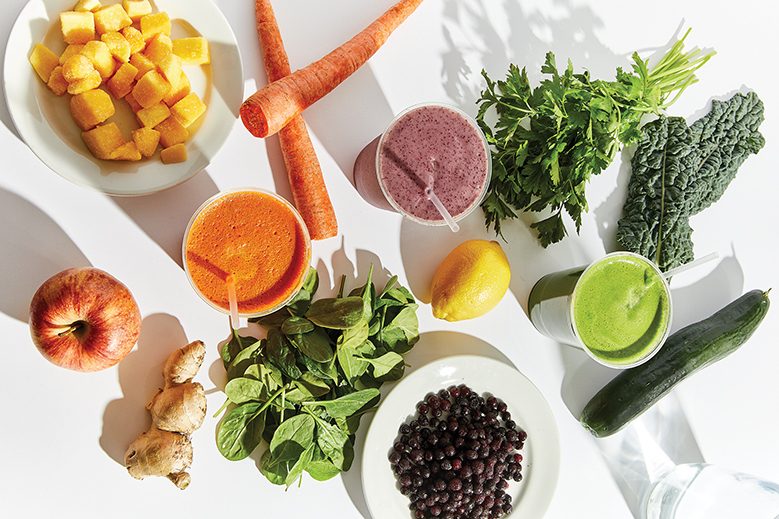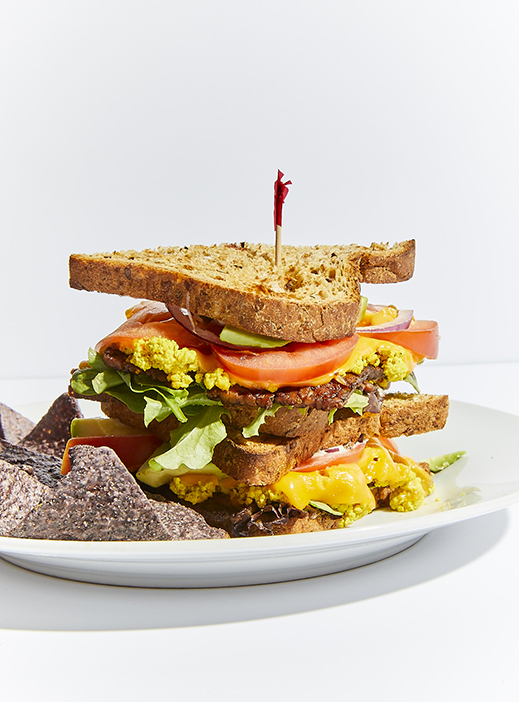
Remember when veganism was funny? When the idea of forgoing not just meat, but all animal-based products seemed impossibly weird to just about everyone? You probably do, because it wasn’t that long ago. But over the past decade, veganism has sped from the fringe onto mainstream supermarket shelves and restaurant menus. Cow’s milk has ceded a large portion of the dairy aisle to plant-based alternatives. Burger King, for goodness’ sake, is rolling out a veggie Whopper.
From 2014 to 2017, the number of Americans declaring themselves vegan jumped from 3 million to 19 million, according to analytics company GlobalData, and their numbers are likely to increase as word spreads: Veganism is healthy, good for the planet, and to many people, just the right thing to do.
It was certainly right for Donald Watson, a British woodworker and amateur nutritionist who coined the term “vegan” in 1944. But Watson was hardly the first to believe that meat was bad for the body, and possibly the soul as well. The 19th-century philosopher Jeremy Bentham, for example, was a pioneer of animal rights. (“The question is not, can they reason, nor, can they talk,” he famously wrote, “but can they suffer?”) In the third century C.E., the Greek philosopher Porphyry wrote a treatise titled, “On Abstinence from Animal Food.” In the sixth century B.C., Pythagoras (of theorem fame) required his students to follow an all-plant diet.
Veganism as a diet and a lifestyle began gaining traction in America in the 1960s and ’70s with the publication of the first vegan cookbook, Ten Talents, and the founding of the first soy “dairy.” Modern vegans come to the diet for various reasons, most commonly a concern for animal rights. Titusville resident Jodi O’Donnell-Ames, founder of the nonprofit Hope Loves Company, turned to vegetarianism as a teenager after reading Upton Sinclair’s searing 1906 indictment of the American meatpacking industry, The Jungle. Four months ago, she became vegan, abstaining from dairy and genetically modified organisms. “As I omitted more and more animal products from my diet,” she says, “I felt better and better.”
In a 2019 survey of 12,000 vegans conducted by vegan e-tailer Vomad, 68 percent said they adopted the diet out of concern for animals. “Veganism,” says Doris Lin, director of legal affairs for the Animal Protection League of New Jersey, “is based on a belief that animals can suffer and therefore have a right to live their lives free of human use and exploitation.”
Self-identifying ethical vegans eschew not just meat, but also any product based on what they consider animal exploitation, including dairy, eggs, honey, leather, wool and silk. Dairy farming, for instance, generally involves the slaughter of male calves, who can’t produce milk; much cheese-making requires rennet, the lining of a calf’s stomach. And at least some bees are killed in the removal of honey from the comb. White sugar is taboo for many vegans, since it’s usually refined with char made from the burning of cow bones.

A sandwich from Subia’s Cafe in Jersey City. Photo by Michael Persico
According to the Vomad survey, more than 17 percent of vegans adopt the diet for health concerns, and there are compelling reasons to believe those folks are onto something. A 2014 study by Loma Linda University’s Department of Nutrition concluded that vegan diets tended to extend life and to protect against cardiovascular diseases, some cancers, obesity, hypertension and type-2 diabetes. Eli Scheiman, a lawyer from South Orange, became a vegan at 23 because, he says, “even as a kid, my cholesterol was off the charts.” Since adopting the diet 17 years ago, his total cholesterol has ranged from 130 to 170, well below 199, the uppermost number in the desirable range.
In a culture where meat is a dietary mainstay, non-vegans often question whether a vegan diet can deliver sufficient protein, but in fact, many plantbased foods are high in protein: A cup of soy-based tempeh offers 34 grams of it (roughly equal to four ounces of beef); four ounces of extra-firm tofu has 9-10 grams (roughly the same as two large eggs); and most legumes, 15 grams per cup (nearly twice as much as skim milk).
Although not all plant-based proteins contain the full gamut of amino acids, Chris Hirschler, department chair of Health and Physical Education at Monmouth University and himself a vegan, says that “for most people, as long as they’re eating a balanced diet, they’re going to get enough protein and amino acids—and a good portion of Americans probably eat too much protein anyway.” One thing vegans must be aware of is getting sufficient B12, a vitamin essential for cardiovascular, neurological and adrenal health. But this is easily assured with a daily B12 supplement.
It’s true that you can eat an unhealthy vegan diet—if you subsist, say, on french fries and pancakes with maple syrup. Hirschler notes, though, that even people who become vegans for reasons other than health tend to eat an increasingly healthy diet as they learn more about vegan nutrition.
People also go vegan out of concern for the environment. In fact, in the Vomad survey, nearly 10 percent of participants cited environmental concerns as their motivation. “It’s incredibly wasteful to put so many resources into growing crops to feed animals instead of eating those crops directly,” says Lin. Livestock, for instance, contribute 14.5 percent of the world’s greenhouse gases; of the world’s agricultural products, produce and grains have the smallest carbon footprints.
If any or all of that compels you toward veganism, but you aren’t quite there yet, consider adopting the diet gradually by eating fewer animal products and more plant-based foods. “Don’t worry so much about labels like ‘vegan,’” Hirschler says. “Just keep eating healthier and healthier.”
